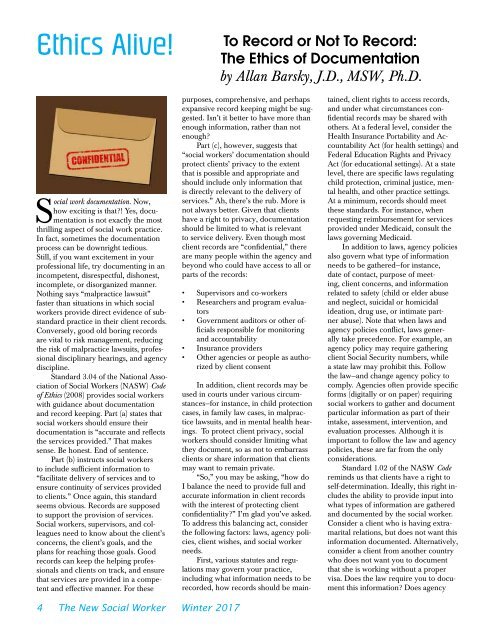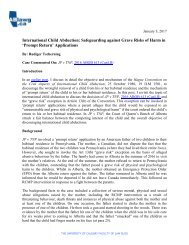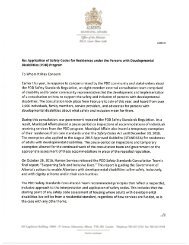In This Issue
click
click
You also want an ePaper? Increase the reach of your titles
YUMPU automatically turns print PDFs into web optimized ePapers that Google loves.
Ethics Alive!<br />
To Record or Not To Record:<br />
The Ethics of Documentation<br />
by Allan Barsky, J.D., MSW, Ph.D.<br />
Social work documentation. Now,<br />
how exciting is that?! Yes, documentation<br />
is not exactly the most<br />
thrilling aspect of social work practice.<br />
<strong>In</strong> fact, sometimes the documentation<br />
process can be downright tedious.<br />
Still, if you want excitement in your<br />
professional life, try documenting in an<br />
incompetent, disrespectful, dishonest,<br />
incomplete, or disorganized manner.<br />
Nothing says “malpractice lawsuit”<br />
faster than situations in which social<br />
workers provide direct evidence of substandard<br />
practice in their client records.<br />
Conversely, good old boring records<br />
are vital to risk management, reducing<br />
the risk of malpractice lawsuits, professional<br />
disciplinary hearings, and agency<br />
discipline.<br />
Standard 3.04 of the National Association<br />
of Social Workers (NASW) Code<br />
of Ethics (2008) provides social workers<br />
with guidance about documentation<br />
and record keeping. Part (a) states that<br />
social workers should ensure their<br />
documentation is “accurate and reflects<br />
the services provided.” That makes<br />
sense. Be honest. End of sentence.<br />
Part (b) instructs social workers<br />
to include sufficient information to<br />
“facilitate delivery of services and to<br />
ensure continuity of services provided<br />
to clients.” Once again, this standard<br />
seems obvious. Records are supposed<br />
to support the provision of services.<br />
Social workers, supervisors, and colleagues<br />
need to know about the client’s<br />
concerns, the client’s goals, and the<br />
plans for reaching those goals. Good<br />
records can keep the helping professionals<br />
and clients on track, and ensure<br />
that services are provided in a competent<br />
and effective manner. For these<br />
purposes, comprehensive, and perhaps<br />
expansive record keeping might be suggested.<br />
Isn’t it better to have more than<br />
enough information, rather than not<br />
enough?<br />
Part (c), however, suggests that<br />
“social workers’ documentation should<br />
protect clients’ privacy to the extent<br />
that is possible and appropriate and<br />
should include only information that<br />
is directly relevant to the delivery of<br />
services.” Ah, there’s the rub. More is<br />
not always better. Given that clients<br />
have a right to privacy, documentation<br />
should be limited to what is relevant<br />
to service delivery. Even though most<br />
client records are “confidential,” there<br />
are many people within the agency and<br />
beyond who could have access to all or<br />
parts of the records:<br />
• Supervisors and co-workers<br />
• Researchers and program evaluators<br />
• Government auditors or other officials<br />
responsible for monitoring<br />
and accountability<br />
• <strong>In</strong>surance providers<br />
• Other agencies or people as authorized<br />
by client consent<br />
<strong>In</strong> addition, client records may be<br />
used in courts under various circumstances—for<br />
instance, in child protection<br />
cases, in family law cases, in malpractice<br />
lawsuits, and in mental health hearings.<br />
To protect client privacy, social<br />
workers should consider limiting what<br />
they document, so as not to embarrass<br />
clients or share information that clients<br />
may want to remain private.<br />
“So,” you may be asking, “how do<br />
I balance the need to provide full and<br />
accurate information in client records<br />
with the interest of protecting client<br />
confidentiality?” I’m glad you’ve asked.<br />
To address this balancing act, consider<br />
the following factors: laws, agency policies,<br />
client wishes, and social worker<br />
needs.<br />
First, various statutes and regulations<br />
may govern your practice,<br />
including what information needs to be<br />
recorded, how records should be maintained,<br />
client rights to access records,<br />
and under what circumstances confidential<br />
records may be shared with<br />
others. At a federal level, consider the<br />
Health <strong>In</strong>surance Portability and Accountability<br />
Act (for health settings) and<br />
Federal Education Rights and Privacy<br />
Act (for educational settings). At a state<br />
level, there are specific laws regulating<br />
child protection, criminal justice, mental<br />
health, and other practice settings.<br />
At a minimum, records should meet<br />
these standards. For instance, when<br />
requesting reimbursement for services<br />
provided under Medicaid, consult the<br />
laws governing Medicaid.<br />
<strong>In</strong> addition to laws, agency policies<br />
also govern what type of information<br />
needs to be gathered—for instance,<br />
date of contact, purpose of meeting,<br />
client concerns, and information<br />
related to safety (child or elder abuse<br />
and neglect, suicidal or homicidal<br />
ideation, drug use, or intimate partner<br />
abuse). Note that when laws and<br />
agency policies conflict, laws generally<br />
take precedence. For example, an<br />
agency policy may require gathering<br />
client Social Security numbers, while<br />
a state law may prohibit this. Follow<br />
the law—and change agency policy to<br />
comply. Agencies often provide specific<br />
forms (digitally or on paper) requiring<br />
social workers to gather and document<br />
particular information as part of their<br />
intake, assessment, intervention, and<br />
evaluation processes. Although it is<br />
important to follow the law and agency<br />
policies, these are far from the only<br />
considerations.<br />
Standard 1.02 of the NASW Code<br />
reminds us that clients have a right to<br />
self-determination. Ideally, this right includes<br />
the ability to provide input into<br />
what types of information are gathered<br />
and documented by the social worker.<br />
Consider a client who is having extramarital<br />
relations, but does not want this<br />
information documented. Alternatively,<br />
consider a client from another country<br />
who does not want you to document<br />
that she is working without a proper<br />
visa. Does the law require you to document<br />
this information? Does agency<br />
4 The New Social Worker Winter 2017




